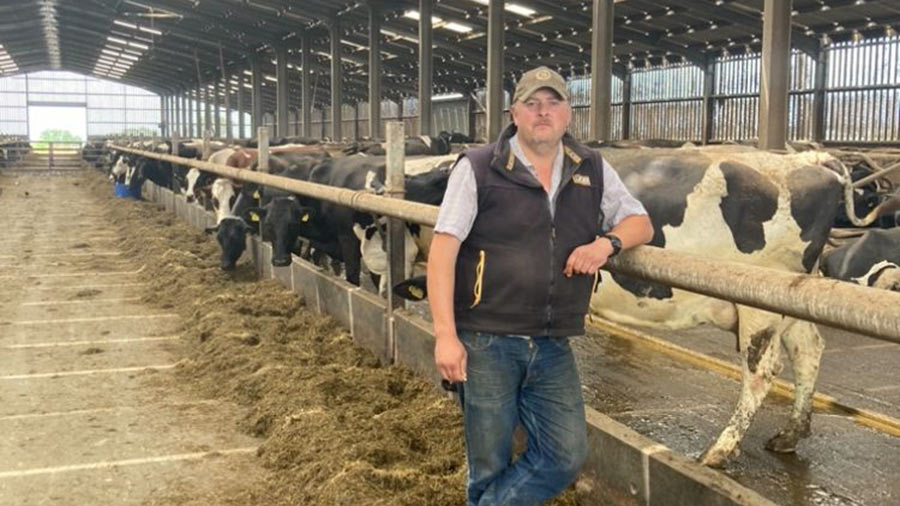Pembrokeshire dairy farmer loses 53 more cows to bovine TB
 Pembrokeshire farmer Steve Evans © Steve Evans
Pembrokeshire farmer Steve Evans © Steve Evans A Pembrokeshire dairy farmer has lost 53 more cows to bovine TB and slammed the Welsh government for its ongoing failure to tackle the disease in all areas.
Steve Evans was milking 500 Holstein-Friesian cows last July, but his herd numbers have now diminished to 360.
On Thursday 2 May, Mr Evans suffered his worst ever TB test results, meaning he has lost about 200 cows to TB since last July.
See also: New first minister must reset farm policies, says NFU Cymru
“The Welsh Labour government are standing behind the rhetoric of their bovine TB policy and claiming that it’s an improving picture,” said Mr Evans.
“Well, it’s clearly not. You only have to speak to vets to find out the truth. There are more herds going down with TB in Pembrokeshire than there are going clear.”
Emotional turmoil
Mr Evans says the latest outbreak has hit him hard – both emotionally and financially – and with the failure in policy, he believes there is no incentive to continue producing milk when “repeating failure is the only outcome that’s going to happen”.
“A bloody disgrace. Repeated failure by the Welsh government.”
Welsh dairy farmer Steve Evans @Evsthetractor found out yesterday that he will lose another 53 cows because of TB. 15% of his herd gone.
Farmers’ livelihoods are at risk – often caused by bad government policies. pic.twitter.com/mtyv74mIUe
— No Farmers, No Food (@NoFarmsNoFoods) May 3, 2024
The 53 cows tested positive for TB during short-interval (60 days) testing, which is a requirement under Welsh government policy when a farmer is under TB restrictions.
The condemned cows have been isolated from the rest of the herd and will be taken away for slaughter within the next fortnight.
Mr Evans say the latest experience has shown that the Welsh government’s approach of more testing (both skin and blood), which is targeted to clear the residual infection in the herd, is not working – as a result, he has lost just as many cows this time.
“This demonstrates the failure in the testing toolbox when there is another test, the Enferplex test, which is acknowledged as being absolutely brutal.
“However, the Welsh government needs to decide whether they want to get rid of TB or not,” he said. “Because as things stand, it’s getting worse, not better.”
Mr Evans said wildlife control was also needed – testing and removing one species, cows, and removing the other, badgers, was “fundamentally not acceptable any more”.
New minister
He said Wales’ new rural affairs secretary, Huw Irranca-Davies, had an opportunity to “put a marker down and change the direction of TB policy for the better”.
“It is an extremely turbulent time for the Welsh farming industry. There is very little confidence out there. I would welcome a visit to our farm from Huw Irranca-Davies to see the issues first-hand.
“He wants to do a job and be proactive. So let’s get him out on the farm the day that 53 cows are going and the heavily in-calf dry cows get put down on farm.
“He can bring first minister Vaughan Gething too.”
Welsh government response
A Welsh government spokesperson said: “We fully recognise the TB situation varies across different parts of Wales, which is why we are taking a targeted approach. Overall, we are seeing progress across Wales, with new herd incidents decreasing over the long-term.
“Our Programme for Government makes clear we will not cull badgers. Studies have shown that cattle-to-cattle transmission rates are also greater than badger-to-cattle. Comparatively, Wales has seen a very similar reduction in TB incidence to England over the period 2013-2022 without badger culling.
“There are ways farmers can limit the introduction of TB into their herds through good biosecurity. This includes measures such as limiting badger contact and reducing the risk of buying in infected cattle. It is important for farmers to discuss such measures with their vet.”
